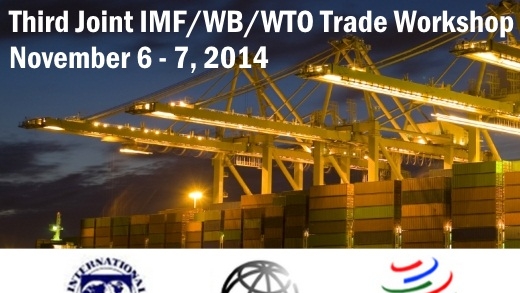The World Bank’s research department co-hosted the Third IMF-World Bank-WTO Joint Trade Workshop, which was held at the IMF on November 6-7, 2014. The event brought together experts on trade from the three institutions to share their latest research findings and discuss current trade issues.
IMF Managing Director Christine Lagarde and WTO Director General Roberto Azevêdo opened the event with an emphasis on trade as a catalyst for growth, the importance of trade research to informed policy, and the ability of research collaboration across the three institutions to increase coherence in policy advice. Speakers at the conference presented research that addressed these themes with contributions on key questions such as: At what stage of development do countries upgrade the quality of their exports? What is the impact of Basel III on trade finance? And what is the implication of global value chains for countries’ tariff and non-tariff policies?
On the first day of the workshop, trade experts from the IMF, World Bank, and WTO presented papers on topics ranging from services trade and exporting firms to the global trade slowdown. For example, Paolo Bastos (World Bank) and Daniel Dias (University of Illinois) examined a detailed panel of data from manufacturing firms in Portugal to shed light on the details behind the seemingly ubiquitous result that exporting firms everywhere tend to have “better” characteristics than non-exporters—i.e., they are larger, more productive, and pay higher wages. The new evidence from Portugal suggests that these features only gradually arise over the life cycle of exporting firms; as firms age, they tend to pay higher wages, import more expensive inputs, and charge higher prices for exports. This suggests a life cycle in which successful exporters typically start small and then grow progressively and upgrade the quality of their products as they age.
In work with Ingo Borchert (University of Sussex), James Anderson (Boston College) and Yoto Yotov (Drexel University), Aaditya Mattoo (World Bank) focused on the neglected topic of trade costs and services trade. Their work has contributed a major extension to the decades-old framework that has almost exclusively focused on understanding international trade in goods. Their novel adaptation constructs estimates of border effects and trade costs for 12 service sectors, thereby developing a methodological approach that is expected to bear further fruit in future analysis of services policy.
Chad P. Bown also described new research with Emily J. Blanchard (Tuck at Dartmouth) and Robert C. Johnson (Dartmouth College) on value-added trade and trade policy that investigates the implications of global value chains for how countries set their tariff and non-tariff policies. Evidence collected from 15 major economies covering the period 1995-2009 suggests that significant levels of domestic value-added content that is embodied in foreign final goods production can serve to lower bilateral tariffs on final goods imports. This downward pressure on import protection holds for nontariff barriers as well, suggesting that the rise of global value chains may have important implications for how countries set their trade policies and potentially negotiate international agreements.
World Bank Senior Director of the Global Practice on Trade and Competitiveness Anabel Gonzalez, participated in a panel discussion on the “Future of Trade” along with WTO Chief Economist Robert Koopman and IMF First Deputy Managing Director David Lipton. The panelists engaged in a free-flowing discussion that highlighted a number of key unknowns for researchers to monitor and investigate. These include further study of the issues raised by the research presented during the conference, as well as additional topics such as non-tariff barriers to trade, trade frictions, and the potential for improved coherence between multilateral agreements and the preferential or plurilateral approaches taking place under “mega-regional” negotiations such as the TPP (Trans-Pacific Partnership), TTIP (Transatlantic Trade and Investment Partnership) and RCEP (Regional Comprehensive Economic Partnership).
Some of the topics covered on the second day were trade finance and policy, which included case studies on Tunisia and Albania. Bob Rijkers (World Bank) presented “All in the Family: State Capture in Tunisia” with Antonio Nucifora (World Bank) and Caroline Freund (Peterson Institute). Their work examines the relationship between investment regulation and political connections. Their presentation focused on a case study that exploits a unique dataset capturing the detailed business interests of the Ben Ali family in Tunisia prior to the Arab Spring. While the sectors in which politically-connected firms are active are disproportionately subject to authorization requirements and foreign direct investment restrictions, the connected firms nevertheless outperform their competitors in employment, output, market share, profits, and growth, with larger differences in the more-regulated sectors.
Ana Fernandes, Russell Hillberry, and Alejandra Mendoza (all World Bank) used a recent effort to reform customs procedures in Albania to study a number of issues associated with “aid-for-trade” as well as the Trade Facilitation Agreement that was negotiated to conclusion at the WTO ministerial meeting in Bali in 2013. In their paper, “Customs Reform and Trade Growth: Evidence from Albania,” they examined how improvements in risk management procedures adopted by customs officials at the border lower the rates of physical inspections that otherwise cause delays and impede trade. Their preliminary estimates suggest that reductions in time in customs are associated with sizeable increases in imports. The growth is driven by increases in traded quantities, number of shipments, and the number of firms involved in importing activities.
This year’s workshop was co-organized by Michele Ruta (IMF), Chad P. Bown (World Bank), and Marc Auboin (WTO). The first two workshops in the series were hosted by the World Bank (Washington) in December 2011 and the WTO (Geneva) in June 2013. This year’s event was hosted by the IMF at its headquarters in Washington, DC.

